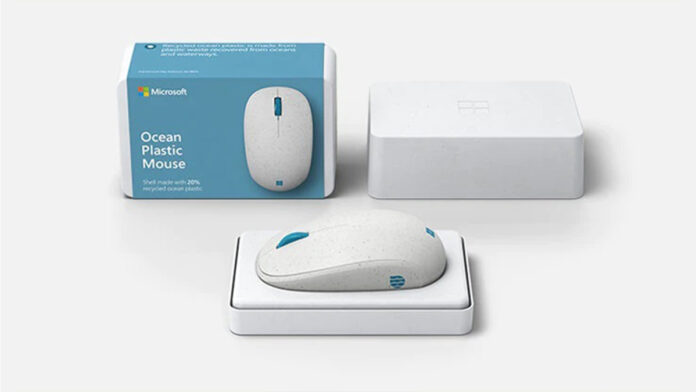As part of a new effort to advance the use of recycled ocean plastic, SABIC, a global leader in the chemical industry, and Microsoft Corporation have collaborated to create Microsoft’s first
consumer electronic product – The Microsoft Ocean Plastic Mouse – with an exterior shell containing 20% recycled ocean plastic.
Ocean plastic is defined as plastic that has been certified by a third party as recovered from any ocean or ocean-feeding waterways or where it washed ashore from these locations. Ocean plastic differs from ocean-bound plastic in that ocean-bound plastic is recovered from ocean-feeding waterways, shorelines, and inland areas within a 50-kilometer radius of the ocean. The two recycled products play complementary roles in helping address the issue of ocean plastic waste.
Microsoft began this project with an objective of creating a plastic resin made from at least 10% recycled ocean plastic as part of its commitment to achieve zero waste by 2030. After hearing the initial vision for the project, SABIC joined the effort to source the recycled material and to formulate a resin that satisfied Microsoft’s demanding quality standards. The Microsoft design team collaborated with technologists at SABIC to provide feedback on prototypes made with the new resin. This effort resulted in several rounds of reformulation prior to arriving at a final version that exceeded Microsoft’s initial 10% goal. The final product contains 20% recycled ocean plastic by weight in its external casing or “shell.”
The SABIC-Microsoft collaboration envisions SABIC providing a new XENOYTM resin for Microsoft product use that is comprised of 20% ocean plastic, as part of SABIC’S TRUCIRCLETM portfolio and services. This new XENOYTM resin with recycled ocean plastic can help reduce plastic waste in the ocean. For example, based on a resin grade comprised of 20% recycled content, for every 1kT of product containing recycled ocean-plastic XENOYTM PC/PET compound, an equivalent of 24 million single-use 0.5liter PET water bottles is removed from the ocean, ocean-feeding waterways, or ocean-adjacent shores.
This project has also provided a blueprint to demonstrate to the broader industry sector that
recycling and reusing valuable plastic resins that have been recovered from the ocean, ocean – feeding waterways or where they have been washed ashore from these locations, is achievable when value chain partners use their knowledge and expertise and work together.
Remarking on these significant advances in plastics recycling, Abdullah Al-Otaibi, ETP & Market
Solution General Manager at SABIC said, “SABIC faced a unique challenge in overcoming the
degradation of ocean plastic to create this innovative solution – due to exposure to sunlight and water, the plastic loses many of its original properties. Our collaboration with Microsoft represents an exciting development in recycling and reusing ocean plastic to create high-quality consumer electronic products that meet Microsoft’s high-performance expectations, while also playing a role in cleaning up the world’s oceans.”
Frank Kuijpers, General Manager Corporate Sustainability at SABIC added: “This addition to our TRUCIRCLETM portfolio is another demonstration of SABIC’s collaboration with the value chain to help create new value from used plastics. By creating more sustainable materials and forging new collaborations, we are setting an example for the industry in how we can transform difficult-to-recycle materials such as ocean plastic into innovative products that can meet the high-quality demands of our customers.”
“As part of our commitment to the reduction of waste, we set out to prove the viability of recycled ocean plastic as a material for use in consumer electronics. The Microsoft Ocean Plastic Mouse, with an outer shell made with 20% recycled ocean plastic, is the first consumer electronics product made with this XENOYTM resin. We are proud of the collaboration with SABIC that created this new resin from a challenging material that would otherwise remain in the ocean as waste. We hope that this first step on recycled ocean plastic will spur further action in our industry and are excited for customers to be able to experience the product,” said Donna Warton, VP Supply Chain and Sustainability at Microsoft.
The collaboration builds on SABIC’s announcement in April of this year that it had become afrontrunner in the industry for the development of ocean-bound plastics. These ocean and ocean-bound materials form part of SABIC’s TRUCIRCLETM portfolio and services, which showcase the company’s circular innovations and can help to provide our customers with access to more sustainable materials. In doing so, SABIC aims to help its customers give the end-consumer more confidence about buying products with the knowledge that the material has been recycled and produced in a way that can help protect our planet.
SABIC’s TRUCIRCLE portfolio spans a range of products and services, including design for
recyclability, mechanically recycled products, certified circular products from feedstock recycling of used plastic, certified renewables products from bio-based feedstock and closed-loop initiatives to recycle plastic back into high quality applications and help prevent valuable used plastics from becoming waste.












